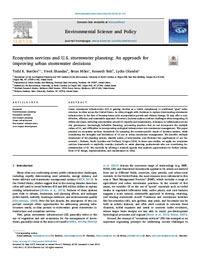Green stormwater infrastructure is gaining traction as a viable complement to traditional “gray” infrastructure in cities across the United States. As cities struggle with decisions to replace deteriorating stormwater infrastructure in the face of looming issues such as population growth and climate change, green stormwater infrastructure may offer a cost-effective, efficient, and sustainable approach. However, decision makers confront challenges when integrating green stormwater infrastructure within city plans, including uncertainties around greenwater infrastructure capacity and maintenance, resistance to collaboration across city governance, increasingly inflexible financing, accounting practices that do not incorporate the multiple values of green stormwater infrastructure, and difficulties in incorporating ecological infrastructure into stormwater management. This article in the journal Environmental Science and Policy presents an ecosystem services framework for assessing the context-specific needs of decision makers, while considering the strengths and limitations of greenwater infrastructureuse in urban stormwater management. It describes multiple dimensions of the planning system, identifies points of intervention, and illustrates two applications of our framework—in Durham, North Carolina, and Portland, Oregon. In these case studies, the framework is applied to explicitly consider tradeoffs, thereby assisting planning professionals who are considering implementation of green stormwater infrastructure. The article includes a research agenda that explores opportunities for further evaluations of greenwater infrastructure design, implementation, and maintenance in cities.
 Issues & Projects
Issues & Projects
